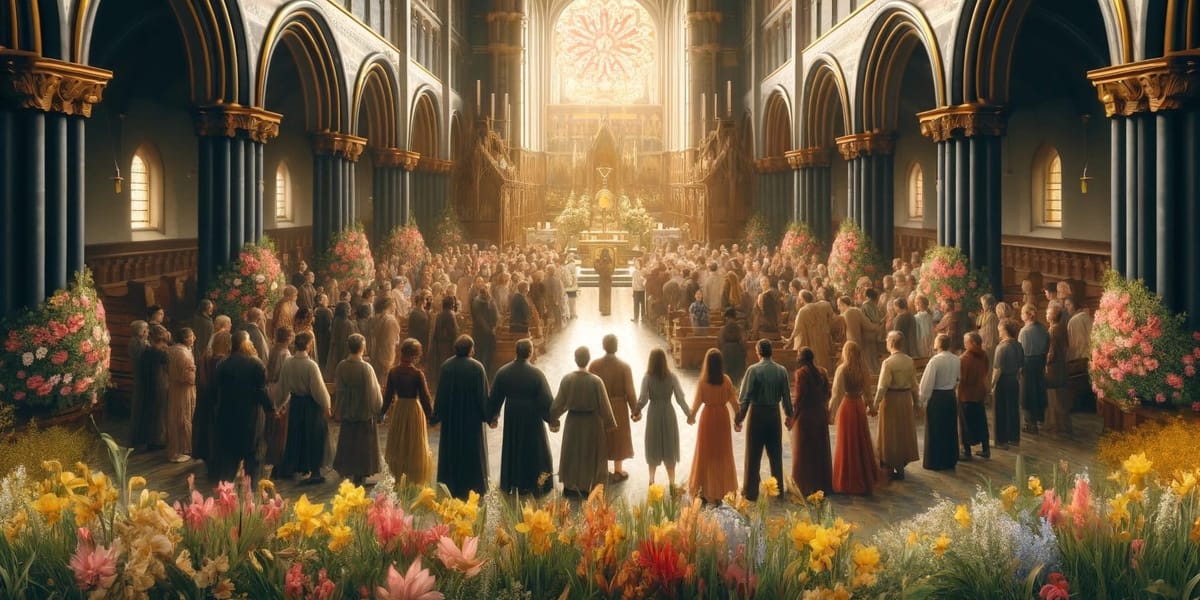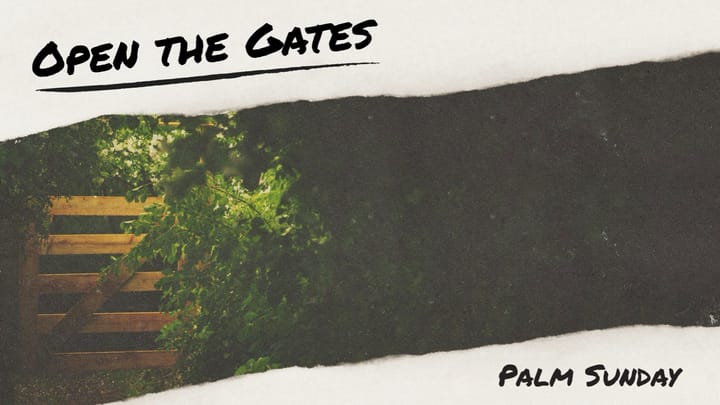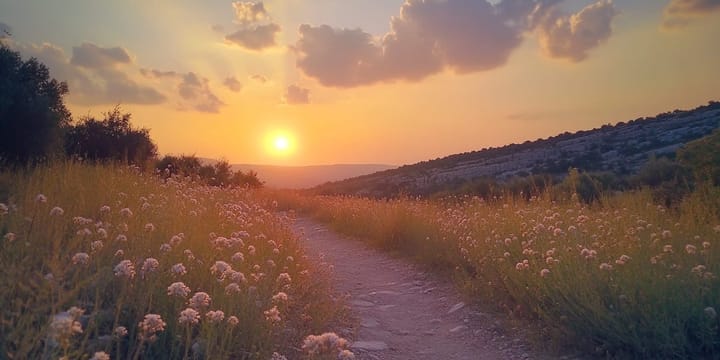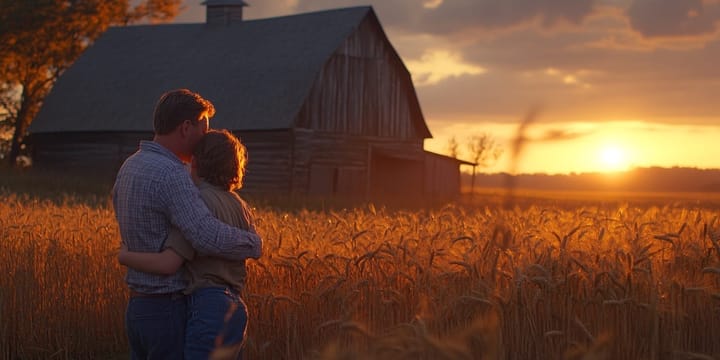Fairhaven Sermon 4-7-2024
In this week's sermon, Rev. Peg Bowman focuses on the post-Easter experiences of the disciples, underscoring the unity among believers and the importance of confronting doubts as intertwined themes illuminated by scripture.

Summary
In this week's sermon delivered by Rev. Peg Bowman, she emphasizes the continuing celebration of Easter, leading up to Pentecost, and connects the themes of unity among believers and facing doubts through scripture. The sermon begins with personal reflections on an upcoming journey to the southern border to work with immigrants, setting a tone of active faith and concern for social issues. Rev. Peg then transitions into discussing the post-Easter scriptures focusing on the disciples' experiences of Jesus' resurrection, highlighting how these stories underscore unity and the confrontation with doubts. She utilizes Psalm 133 to delve into the joy found in God's presence, relating it to the ascents to Jerusalem, and likens the unity among believers to the anointing of Aaron, symbolizing the outpouring of the Holy Spirit over the community.
Rev. Peg further illustrates her message by drawing parallels between the unity and generosity observed in the early Christian community, as depicted in the Book of Acts, with the contemporary need for believers to embody these principles. She uses modern examples of communal living and sharing among faith communities to argue that such unity is still relevant and powerful today. The sermon concludes with an insightful interpretation of Jesus' appearance to his disciples after his resurrection, as narrated in the Gospel of John, where Jesus imparts peace and the Holy Spirit, reinforcing the sermon's themes of unity, forgiveness, and faith. Rev. Peg's message encourages the congregation to live out the Easter story through unity, service, and faith, echoing the transformative power of Jesus' resurrection and its implications for believers today.
Transcript
Well, Happy Easter! Hey, I didn't get a chance to say that to y'all last week. Easter does continue until Pentecost, which I'm very happy about. I'm so glad that Easter is longer than Lent, right? So we continue on observing Easter. Before I get into the sermon, I did want to let folks know, if you're not aware already, that I will be out next Sunday and most of the following week I'm traveling with a group of women to the border, the southern border at El Paso.
You know my interest in immigrants and refugees and things like that, so I'll be heading down to the border. And I do understand that we'll be meeting both with the security folks down there in Texas but also crossing over and meeting some of the folks who are waiting to come in Mexico. So please keep us in prayer on that. It's not exactly dangerous but it's not exactly safe.
So just keep us, it's going to be, they're going to be very long days and just pray that I keep my energy up and manage to keep up with the team as they move. So that's coming up next week. Meanwhile, this week we are still celebrating Easter, like I said. So over the next few weeks, our scripture readings are going to focus on the disciples' various experiences of Jesus' resurrection, who saw it, what was seen, what was said, what it means, and so forth.
We saw, we hear about Thomas this morning. Our readings this week have two points of focus though in general. First is the unity of believers and the second is facing into doubts. And these two things may seem kind of unrelated but they're not as the scriptures will show us coming up through all the scriptures that we heard this morning.
So I'd like to start today with the Psalm that we read a few moments ago. On the surface, this Psalm has absolutely nothing to do with Easter. In fact, it doesn't make a whole lot of sense to begin with talking about oil and beards and things like that. Where is this going? So this Psalm was written a long time before Jesus was born and it really has no prophecy in it that mentions the Messiah.
But the theme of the Psalm is joy, pure, unadulterated joy that comes from enjoying God's presence. So Psalm 133 is one of the Psalms of ascents. That is one of the Psalms that was set to music and was sung while the people of Israel were walking up the hill to Jerusalem to worship in the temple. And you may have heard me say this before, but the temple mount is very high up.
It's over 2,400 feet high. And today, if you're driving it from the valley to the top of the mountain, it takes about a half an hour driving 60 or 70 miles an hour doing switchbacks up the hill. Because no motor or person could go straight up. You have to do kind of doing this.
So when people were walking this journey, it would take at least a day to get to the top of the hill. And so people would sing to keep their spirits up as they were traveling. And these were called songs of ascents and songs to climb by, you might say. And so that's what this particular Psalm is.
So songs of ascents were songs of joy because they called to mind what it was like to be close to God, to stand in God's presence, to lose oneself in the glory and majesty of God. And it's not an experience that people had very often, not back then, and unfortunately not today either. But think of the stories that came out of Asbury recently, where people got caught up in God's presence and didn't want to leave. And they kept on worshiping for days.
That's the kind of things that these songs had in mind. And I wish we had more experiences like that in or out of church, because experiences like this strengthen the soul and they nourish the spirit. And they're like a cup of cold water on a hot summer's day. So this Psalm, Psalm 133, is a song of ascents.
But this one's a little bit mysterious. Like I said, it focuses on the oil on the beard of Aaron and the dew on the mountain of Hermon. Two things that are completely outside of our experience, but they do have a meaning. So the Psalm starts out, How very good and pleasant it is when kindred live together in unity.
There's that unity. It is like the precious oil on the head running down the beard, on the beard of Aaron, running down over the collar of his robes. And we know from the Old Testament that Aaron was Moses' nephew and that he was the very first high priest of Israel. When Aaron was anointed to do his job as high priest, there was a very specific recipe, it's detailed in Scripture, for the scented oil that was used to anoint him.
And this recipe was considered holy, and the smell of it was said to be wonderful. And this oil would be poured out all over Aaron, over his head, over his beard, over his robes. And his robes, by the way, included 12 stones on the breastplate that represented the 12 tribes of Israel. So the oil would get on the 12 tribes of Israel, symbolically, and all the way down to the hem of his garment.
And from that time forward, whenever Aaron put on his priestly robes, that smell would remind people of God. As kind of, you know what a powerful thing a smell is? I mean, if you ever walk into a bakery and they're cooking the same recipe that your mother used to cook, right? And it immediately takes you back to the kitchen of the house that you grew up in, right? I mean, it's like that smell. Same thing here, one whiff of that oil, and it would bring back to the people all the times that they had spent in God's presence. It's just like that.
And what's more, this oil also represents the way the Holy Spirit moves and works. So just like on that first Easter day, when Jesus found the disciples in the locked room, he poured out the Holy Spirit on them. And oil represents the Holy Spirit. So it starts with Jesus, the head of the body, so to speak, the head of the church, and then flows down over the whole body of believers, every one of us.
Jesus' death and resurrection makes this possible. Without Easter, there can be no Pentecost. But with Easter, the prophecy of Psalm 133 comes true. And the next verse says, It's like the dew of Hermon, which falls on the mountains of Zion.
Totally different concept now. So let me start, first off, by sharing with you a modern invention. Do you have that slide back there? Please pop that up. Modern inventions over in Israel, the Holy Land, especially in the south around Jerusalem, it's a very, very hot and dry country.
So it's difficult to grow crops there. And today, one of the things that's happening in Israel is the practice of capturing dew. Check that out. These little devices to capture dew and then focus them down onto the plants that are being grown to make it possible to grow crops.
They're essentially causing the desert to bloom, as the prophet Isaiah once predicted all those years ago. Now, of course, back in Bible times, these things hadn't been invented yet. So thank you. So the people watched for what they called the dew of Hermon.
Now Hermon was, and it still is, a very tall mountain. Now that one's about 9,000 feet tall. It's one of those ones that snow capped all year long. And whenever fog or dew or anything like that, any moisture passed over Mount Hermon, it would condense and it would cause puddles and then streams, and the streams would run down the mountain and water the land below.
So the dew of Hermon was life-giving good news, as is the resurrection of our Lord Jesus. This good news is like water in a dry and thirsty world. So bottom line, if people are to dwell together in God and in unity with one another, we need the oil of the Holy Spirit, we need the dew of the Holy Spirit dropping on us, pouring into our lives, making us like Jesus, reflecting God's image. And the promise of God is that one day in the power of the Holy Spirit, all of the separations in the body of Christ will be mended and all of God's people will be united once more.
That's the promise of Psalm 133. Then as we turn to the book of Acts, this reading continues talking about Christian unity, but from a different angle. Acts tells us that if the believers were of one heart and one soul, that they held everything in common. This kind of unity was a powerful witness, and the Christian church in those early years grew like a weed, it just took off.
Acts also tells us that the disciples, both men and women, shared the good news of Jesus' resurrection with anyone who would listen. And furthermore, they sold their land and held the money in common so that all of Jesus' people were provided for, no exceptions. This particular form of Christian unity, this financial sharing, didn't last long, historically speaking. I think what happened was that people were expecting that Jesus would come back sooner than later.
Generosity has always been expected among God's people, but not necessarily holding all goods in common. So they were expecting Jesus to be back fairly soon. And when that didn't happen, private ownership began to come back in vogue, so to speak. But I should add, though, that down through history, there have been communities of believers who do share everything in common.
That never died out completely, and they are still very powerful. Monasteries, extended families, faith communities. It's a lifestyle that's not for everyone, and not everyone is called to it. But some of the communities that are still in our time, think of Mother Teresa.
She was a member of an order called the Missionaries of Charity, whose calling was to minister to the poor, and they held everything in common for the sake of the poor. There's another group I've mentioned a little bit ago, the Iona community in Scotland, which is an interdenominational ministry focused on providing materials for people to use in worship. There's another one nearby in Aliquippa, called the Community for Celebration, that focuses on worship and on justice in the workplace. And of course, there are a number of religious orders here in Pittsburgh from different denominations or from no denomination, including the one up across the street from Spencer.
So many examples of communities like this, similar to the early communities of the early church, and very much in the unity of the Holy Spirit, and very powerful in their witness. So the disciples, in the book of Acts, when they started sharing all that they had, that was a powerful witness. And then all of these things, everything we've talked about so far today, take all these things together, made possible by the events that took place in the upper room, as described in the Gospel of John. So John tells us, It was the night of the first Easter day, and the disciples were gathered in the upper room, afraid, with the door locked so that nobody could get in.
And earlier, they had heard Mary say that Jesus was still alive, or that he was alive again, but they hadn't seen Jesus yet. And they weren't so sure that what Mary said wasn't just wishful thinking, and so they were still scared that the Romans might be looking for more victims from more crosses, and so they hid. And in this kind of fear and tension, unity would not have lasted long. But it didn't have to, because Jesus came and removed all doubts.
Jesus walked into the locked room. How, we don't know. It gives us a thrilling look at what resurrected life might be like. This much, though, is sure.
Jesus is not a spirit or a ghost. He had a real body, and the scars from his torture and death were still on it. And this must have been very difficult for the disciples to see, because so many of them had run away that Friday night, afraid. They never saw the very end of what happened to the Lord that they loved.
But now they see it up close and personal, and they are shocked, and they are full of sorrow. But Jesus speaks peace, and he tells them they're forgiven, and all doubts can be set aside. And Jesus shares with the disciples the Holy Spirit, like that holy oil running down Aaron's head and beard. And Jesus says, As the Father sent me, now I am sending you.
And I think all of us probably feel like Thomas sometimes, the guy who wasn't there when the big thing happened, right? The one who didn't get to see with his own eyes. I really can't blame Thomas for wanting to see what everybody else saw. And in fact, he finally did get to see, and to touch, and to know. And Jesus doesn't blame Thomas for wanting to see.
In fact, Jesus welcomes it. But Jesus also says, Blessed are those like you and me who haven't seen and yet still believe. By the power of the Holy Spirit, by the power of that oil running down the beard of Aaron, each one of us is called to be together, to work together, in the power of Jesus' resurrection, which makes forgiveness possible, and also makes it possible for us to do the work that God has called us to do in this world. Each one of us has a story, the same way that Thomas had a story, about how God has reached out to us, how Jesus has touched our lives, how we have entered into forever life with God.
Easter is where our story begins. The resurrection of Jesus and the unity of the believers around us makes possible the witness that we bring to the world. Amen.


